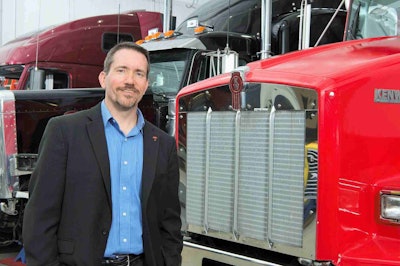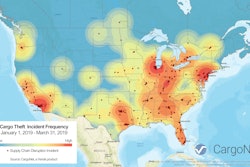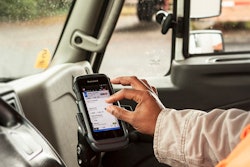
Imagine you arrive at a facility to pick up a load and, checking in with personnel at the gate, the man in the guard shack looks confused, checks and double-checks his list of impending arrivals, only to tell you you’ve already been there. The load is gone.
It’s a situation that’s become more and more common over the years since the so-called “fictitious pickup” cargo theft mode drew enough attention in supply-chain-security circles to warrant specific attention. According to a white paper issued in 2013 by the CargoNet firm, it began to “emerge as a trend around 2005,” growing to account for a significant share of all thefts reported to CargoNet in 2011, with many thefts occurring in California. By 2012, such thefts, sometimes involving thieves’ fraudulent assumption of an existing carrier’s identity, accounted for 8 percent of all thefts reported to CargoNet.
Scott Cornell, 2VP of Transportation and Crime and Theft Specialist at Travelers Insurance, who for years headed the insurance company’s Special Investigations Group devoted to cargo theft, says that straight theft — thieves hitch to a loaded trailer, unload a trailer or otherwise drive away with a full tractor-trailer — remains the most common sort of cargo theft. But these “strategic” thefts, his terminology for the broad category CargoNet IDs as “fictitious pickup,” represent the “fastest-growing method of cargo theft,” Cornell says, accounting today for about 10 percent of thefts nationwide. Most of such thefts are coming from thieves operating in Illinois and Southern California, Cornell adds.
 Scott Cornell
Scott CornellSince the thefts nearly always have a virtual component, thieves can “can target something no matter where it is,” Cornell says. “Part of the difference” — and the attraction for thieves, no doubt — “is that you can be very selective. You can pick out what you want to target rather than randomly picking out a trailer.”

As the CargoNet white paper illustrates, this relatively new kind of theft is taking advantage of the rise of web-based brokering and the sometimes tenuous nature of broker-carrier relationships on the spot market. “Fictitious pickups have grown alongside the expansion of web-based brokering,” according to the CargoNet report, “the ability to set up fictitious companies and websites, and the availability of high-quality fraudulent driver’s licenses. The just in time (JIT) supply chain management practices have exacerbated the problem by putting a premium on speed at the expense of performing time-consuming due diligence in vetting” carriers by brokers, and company employees by carriers, in some instances.
“Computer-savvy criminals (often former employees of trucking and logistics companies),” the report goes on to predict, “will increasingly turn to this modus operandi because it is less risky than traditional cargo theft.”
Carrier identity theft occurs when a thief impersonates a legitimate carrier, secures a load, picks it up and then disappears. Thieves posing as both brokers and carriers, and in some cases successfully claiming old or even active authorities for themselves, are increasingly using this scam.
“In an identity theft scenario,” says Cornell, a carrier or broker is “dealing directly with the bad guy. You’re hiring the bad guy yourself.” Conversely, in another sort of fictitious pickup, you’re dealing with the good guy. “ABC Trucking agrees to Friday at 1 o’clock to pick up the cargo. Everybody involved in that transaction is who they say they are, but the bad guy finds out about that arrangement.” He then shows early and grabs your load, leading to situations like the hypothetical one starting this piece.
Travelers’ in-house investigative unit is famous for its sting trailer, equipped with hidden cameras, tracking devices, hidden mics and more that law enforcement agencies around the nation have used to bust up the various elements of the organized cargo theft rings operating in hot spots and other areas around the country. Cornell says the enforcement community is beginning to “look at ways to use the sting trailer” to combat the gamut of fictitious-pickup scenarios as well, particularly “if there’s an organized ring concentrating on them in certain areas. We might work with law enforcement to try to get the sting trailer to be used one or two of those loads.”
Otherwise, Cornell and other speakers at Truckstop.com’s November Connected 2016 conference encouraged a holistic and preventive approach toward minimizing risk of identity theft and closing other vulnerabilities.
Tactics to minimize straight theft remain prominent in any discussion of cargo theft (with a high-value load, extend your first segment from the origin point before any stop to avoid anyone who may be following you, for instance). But the new threats require better diligence on the part of brokers in vetting carriers they don’t know personally. Double- and triple-check the identities of company reps via phone calls to the legitimate company home. Match phone numbers and other contact/address info on paperwork to home city, state and Department of Transportation (Safer.gov and the CSA Safety Measurement System) listings for the business.
Carriers can protect their identities by regularly logging into their carrier profile with their DOT-issued PIN and keeping all contact information updated and current, likewise proofing for any unauthorized changed. During the Truckstop.com panel on cargo theft, speakers referenced possible vulnerabilities in DOT’s processes, which allow for MCS-150 carrier information form updates in a manner other than online updates using the PIN that carriers are issued to make their online updates. Cases were detailed in which thieves may have utilized such methods to change contact information on a carrier’s profile to go directly to him, for instance, thus enabling him to secure a load as that carrier with a broker.
If you still don’t have a DOT PIN to take control of your registered profile online, follow this link or call (800) 832-5660 for details.
The online update, too, has its vulnerabilities. Once you have your PIN, be careful who you entrust it to, says CargoNet Vice President Sal Marino. While some people might believe FMCSA’s online system is hacked toward carrier identity theft, Marino doesn’t think that’s the case. Too many, he suggests, may just be the result of the PIN being shared too much internally, then getting out to the wrong party through any number of means. (Queries to FMCSA were not answered in final form in time to include in this report. Overdrive will issue a follow-up when the agency responds.)










